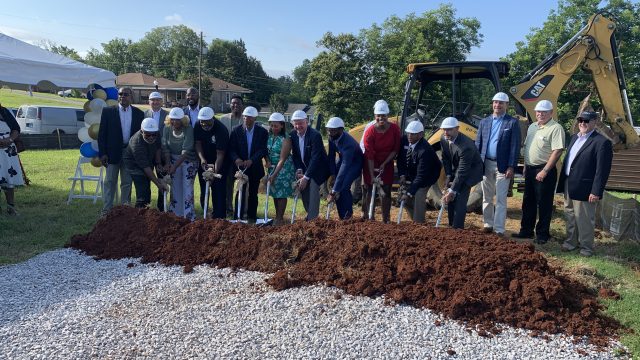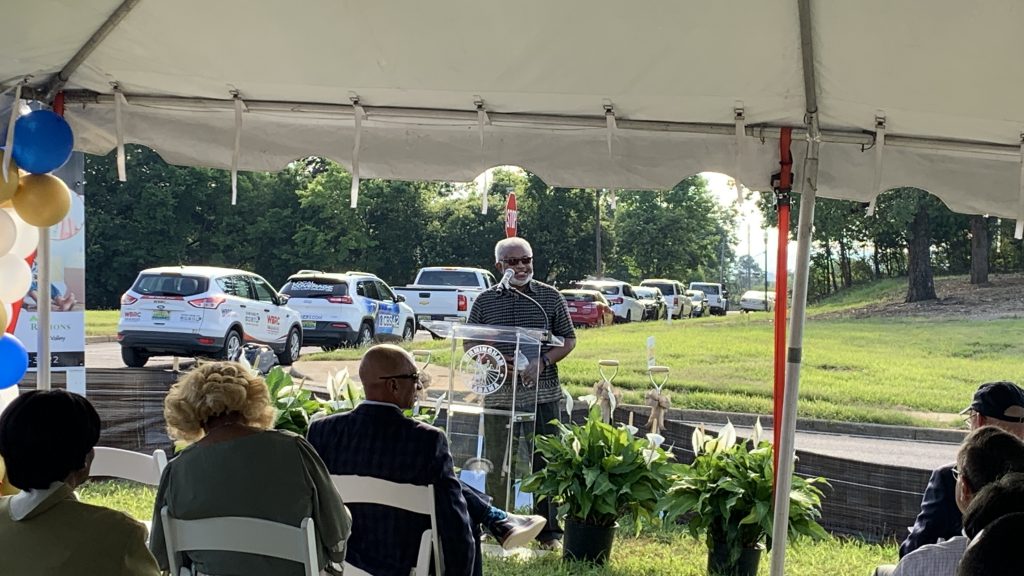
By Ryan Michaels
The Birmingham Times
City officials, neighborhood officers and business leaders were in Ensley’s Belview Heights neighborhood Thursday to break ground the start of a $25 million development deal to build affordable homes in a historic neighborhood.
Oak Hill, a new housing development located near 51st Street Ensley and Avenue K, will feature 28 detached, single-family homes ranging from 1,200 to 1,350 square feet. First closings on the homes are expected to occur in late 2021.
“We want to bring our neighborhood back up to what it should be,” said Johnny Gunn, president of Belview Heights Neighborhood Association. “One of the things that will do that is put new rooftops within the neighborhoods and the communities. We look forward to all the houses that are going up. We look forward to all the new neighbors moving in, buying up houses and starting a new residence. Come in and be a part of the neighborhood.”
New housing is meaningful for residents in the neighborhood and across the city, said Birmingham City Councilor John Hilliard, who represents District 9 where Oak Hill is located.
“I said to [Mayor Woodfin] when he first got elected [in 2017], ‘I want us to make a difference in our city. I want to not just talk about it. I want us to make it happen,’” Hilliard said. “Our neighborhood officers, they said, ‘We need new rooftops, so that we can get new grocery stores, get new opportunity.’ Now, you have new rooftops, you have grocery stores, you have everything that you have talked about. It’s in the works. We’re making it happen.”
The city is partnering with the National Community Reinvestment Coalition Inc.’s NCRC Housing Rehab Fund LLC, or GROWTH by NCRC, to build affordable new homes in the Ensley neighborhood.

Oak Hill is the first project of a $25 million development deal between the NCRC and the city. Through this deal, the NCRC, a private fund which aims to increase wealth in underserved communities, will build Oak Hill and more houses across the city over the next four years.
Bob Dickerson, founder and executive director of the Birmingham Business Resource Center (BBRC) and chairman of the board for the NCRC, said the city needs this new construction.
“We knew that there was a shortage and a need for affordable housing and affordable home ownership in cities like Birmingham. We know that homeownership is at a 50-year low,” Dickerson said.
Mayor Randall Woodfin said revitalization is the solution to Birmingham’s problems.
“As an administration, we’ve said two words over and over—neighborhood revitalization, neighborhood revitalization, neighborhood revitalization,” Woodfin said. “The key to restoration in our city, the key to restoration in our communities, the key to restoration in our 99 neighborhoods lies with those two words.”
The mayor added that the process of revitalization involves more than just construction.
“Revitalization is more than just a place. I believe revitalization is also about people. This new Oak Hills is the start of new opportunities, and it’s our time to restore not just the look of our community, but the feel and the presence for our residents as well.”
The project also features an agreement with the Birmingham Construction Industry Authority to maximize opportunities for minority and women-owned enterprises and veteran-owned small businesses to participate in the development and construction of Oak Hill.
Ensley once was home to steel production and Tuxedo Junction, a bustling district with a thriving nightlife. But with the steel industry’s decline in the 1970s and plant closures, Ensley’s population declined from 40,000 residents to less than 4,000.




